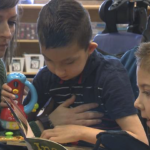My experiences in India will make me a better occupational therapist in the UK
Two weeks after qualifying as an occupational therapist I boarded a plane to India, where I spent two months developing an occupational therapy service for a charity. It was my first time in India, and as I tried to work out which local train would take me to the rural village where the charity was based, I sincerely doubted I would ever find the place, let alone do any effective occupational therapy once I got there.
Volunteering overseas taught me to balance evidence-based practice with respect for other cultures.

‘…attitudes are starting to change. I saw many enterprising people using homemade crutches and wheelchairs in public.’ Photograph: Altaf Qadri/AP
Rosemary Leaver, The Guardian February 4, 2015
What led me to volunteer was essentially the same thing that led me to train as an occupational therapist: an irresistible calling to try to help people, now combined with a strong feeling that healthcare standards should be more consistent on a global level. After weeks of research, I found a charity that needed an occupational therapist and was willing to provide food and accommodation in exchange for volunteer work.
My first week passed in a blur. Seventeen young people lived at the residential school where I was based, aged between five and 35. Many of the young people had learning disabilities, as well as a wide range of physical disabilities and mental health difficulties. As an occupational therapist, I used my skills at assessing and developing fine motor skills, social skills and self-esteem to enable better participation in the classroom, as well as engaging the lower functioning children in sensory activities.
Every day I ran two group sessions and six one-to-one sessions, when I wasn’t training the local staff to continue my work after I left. I lived on the first floor of the school, and the children loved to wave at me from the playground when I sat upstairs in the evenings, processing the day’s experiences and planning the next day’s sessions.
One experience that stands out was taking a child to the occupational therapy department of a large teaching hospital, to get a hand splint made. The senior therapist beckoned us in while he was in the middle of a session, and left his patient lying on the bed while he chatted to us.
Indian OT: “So the boy doesn’t use his left hand at all?”
Me: “No, he has low muscle tone in the whole arm following an epileptic seizure”
Indian OT: “Well, why don’t we just strap his right arm to his body then, force him to use his left hand?”
Me: “Umm, well we usually just play games that stimulate use of both hands…”
Indian OT: “Well I suppose I can make the boy a splint. And you’re sure you don’t want a nice strap for the right arm while you’re here?”
The posters on the walls declared “occupational therapy can help you participate in activities of daily living,” just like you see in the UK. The words were the same, but the whole attitude to healthcare was completely alien to me.
For most people in rural India access to occupational therapy is seriously limited. There’s no concept of care in the community, meaning occupational therapy is only available at large hospitals. There’s also a widespread belief that children with disabilities are born to punish the parents for wrongdoings in a past life, which leads to social stigma.
However, attitudes are starting to change, and I saw many enterprising people using homemade crutches and wheelchairs in public. Wheelchair ramps are also becoming more frequent. Rural India is changing slowly, and many people with disabilities still remain confined to their homes, unable to participate in society.
Volunteering in a healthcare system so different from the UK challenged many of my preconceptions about health and social care. I got used to taking part in professional discussions about energy and karma. This bemused me at first, as a professional trained in the importance of evidence-based practice, but I gradually came to respect this more spiritual way of working with people.
My experiences in India increased my respect for how different cultures interpret the world, and taking this understanding forward will no doubt make me a better occupational therapist as I start my career in the UK.
| If you’d like to blog for us, read our guidelines and email socialcare@theguardian.com |
![]() Source The Guardian
Source The Guardian






